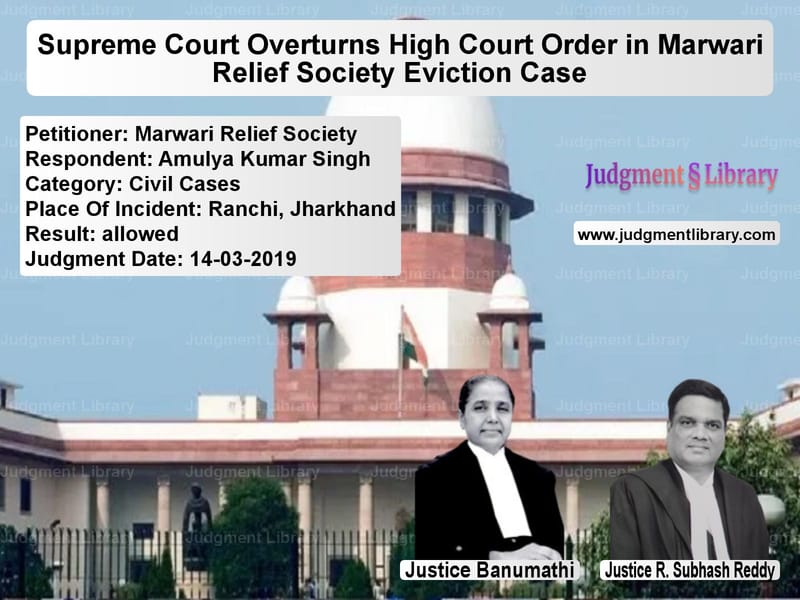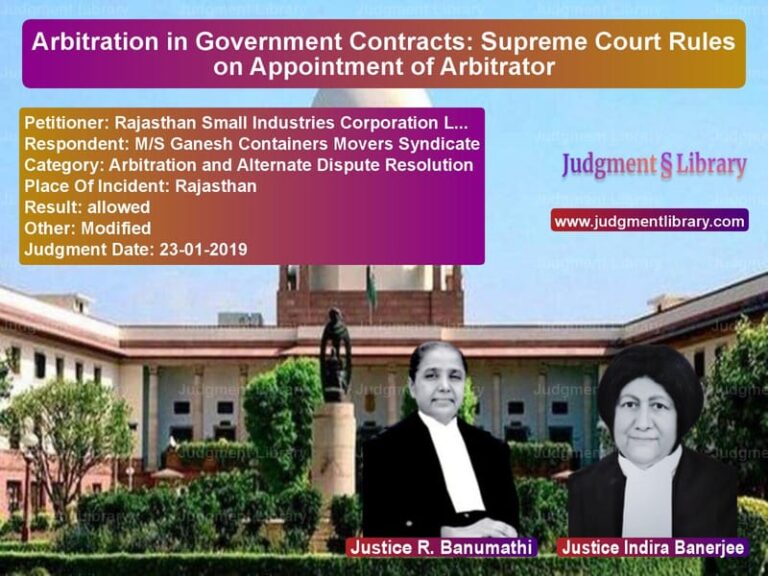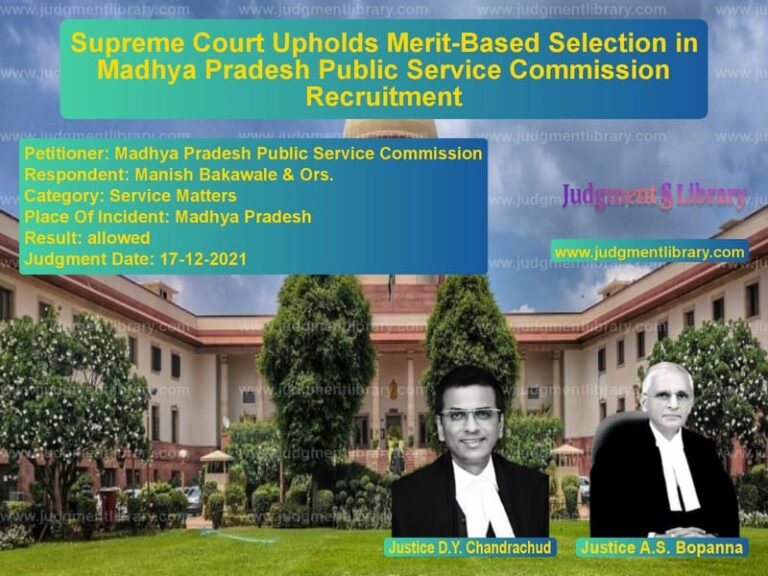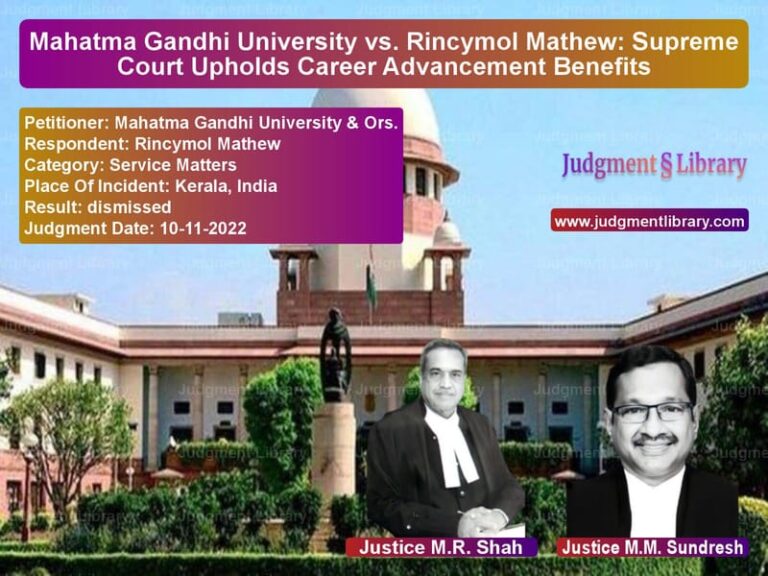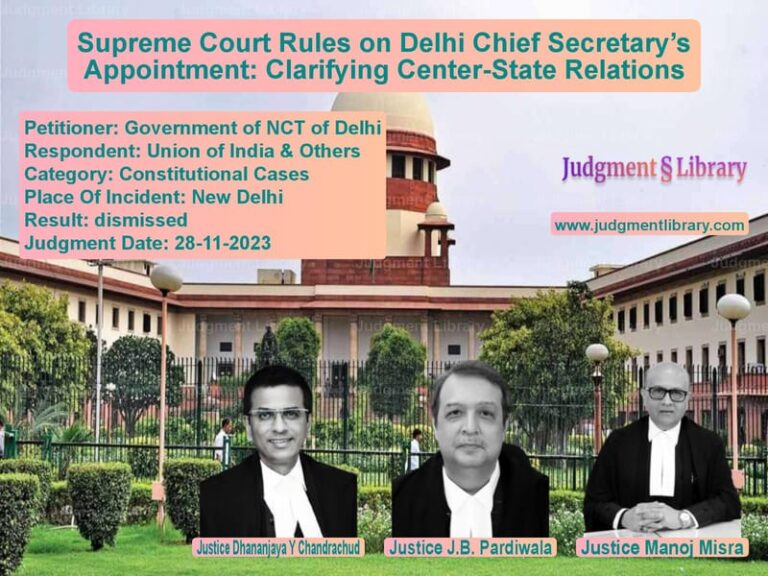Supreme Court Overturns High Court Order in Marwari Relief Society Eviction Case
The Supreme Court of India recently delivered a ruling in the case of Marwari Relief Society vs. Amulya Kumar Singh, a long-standing eviction dispute that dates back to 1991. The case highlights significant legal principles concerning the production of additional documents during trial, the role of power of attorney holders, and procedural fairness in eviction suits.
Background of the Case
The appellant, Marwari Relief Society, is a charitable institution managing a health resort in Ranchi, known as Marwari Arogya Bhawan. The property contains several residential cottages and rooms provided on a leave and license basis. The respondent, Amulya Kumar Singh, had been occupying one such residential cottage since August 4, 1982, under a license agreement. He was required to pay maintenance charges of Rs. 500 per month and electricity charges of Rs. 100 per month.
Over time, Singh allegedly failed to pay the required charges, leading the Society to issue a legal notice on August 19, 1987, demanding payment of Rs. 20,900 and instructing him to vacate the premises. When Singh failed to comply, the Society initiated eviction proceedings through Eviction Title Suit No. 5 of 1991 in the Court of the Subordinate Judge at Ranchi.
Trial Court and High Court Proceedings
- The Trial Court ruled in favor of the Marwari Relief Society in an ex-parte judgment dated September 24, 1992.
- Singh filed an application under Order IX Rule 13 CPC to set aside the ex-parte decree, which was initially rejected on December 18, 1995.
- Singh then appealed to the Appellate Court, which allowed his appeal, restoring the suit to its original number.
- The suit was subsequently transferred between different subordinate courts, during which certain key documents, filed with the original plaint, were either misplaced or became untraceable.
Key Issues in the Case
- Whether additional documents, which were misplaced, could be reintroduced under Order VII Rule 14(3) CPC.
- Whether the Power of Attorney granted to Ramnandan Prasad was valid for filing the eviction suit.
- Whether the High Court erred in rejecting the Trial Court’s decision to accept these documents.
Arguments by the Petitioner (Marwari Relief Society)
The Society argued that:
- The documents in question were already filed along with the plaint but had gone missing due to multiple transfers of the case.
- The Power of Attorney granted to Ramnandan Prasad was valid and was already referenced in the verification of the plaint.
- The Trial Court was correct in allowing the submission of the missing documents under Order VII Rule 14(3) CPC.
Arguments by the Respondent (Amulya Kumar Singh)
Singh contended that:
- The documents were never originally filed and were only being introduced at a later stage.
- The Power of Attorney was not mentioned anywhere except in the verification portion of the plaint.
- The High Court was justified in rejecting the Trial Court’s decision to allow additional documents.
Supreme Court’s Observations
After reviewing the evidence, the Supreme Court ruled in favor of Marwari Relief Society, making the following key observations:
- The documents in question were explicitly referenced in the plaint, including the Agreement dated August 4, 1982 and the eviction notice dated August 19, 1987.
- The Power of Attorney of Ramnandan Prasad was valid and had been referenced in the verification of the plaint.
- The High Court failed to properly examine the averments in the plaint and should not have set aside the Trial Court’s decision.
The court explicitly stated:
“The learned Single Judge was not right in observing that there are no averments made in the plaint in respect of the documents sought to be produced. The verification portion of the plaint clearly states that Ramnandan Prasad is a constituted agent and attorney of the plaintiff.”
Final Judgment
The Supreme Court set aside the High Court’s ruling and reinstated the Trial Court’s decision to accept the additional documents. It further directed the Trial Court to expedite the pending suit, given that the dispute had been ongoing since 1991.
The ruling underscores the importance of procedural fairness, emphasizing that courts must allow litigants a reasonable opportunity to submit necessary documents, especially when such documents were originally part of the record but were misplaced due to administrative reasons.
Petitioner Name: Marwari Relief Society.Respondent Name: Amulya Kumar Singh.Judgment By: Justice Banumathi, Justice R. Subhash Reddy.Place Of Incident: Ranchi, Jharkhand.Judgment Date: 14-03-2019.
Don’t miss out on the full details! Download the complete judgment in PDF format below and gain valuable insights instantly!
Download Judgment: Marwari Relief Socie vs Amulya Kumar Singh Supreme Court of India Judgment Dated 14-03-2019.pdf
Direct Downlaod Judgment: Direct downlaod this Judgment
See all petitions in Property Disputes
See all petitions in Landlord-Tenant Disputes
See all petitions in Judgment by R. Banumathi
See all petitions in Judgment by R. Subhash Reddy
See all petitions in allowed
See all petitions in supreme court of India judgments March 2019
See all petitions in 2019 judgments
See all posts in Civil Cases Category
See all allowed petitions in Civil Cases Category
See all Dismissed petitions in Civil Cases Category
See all partially allowed petitions in Civil Cases Category

